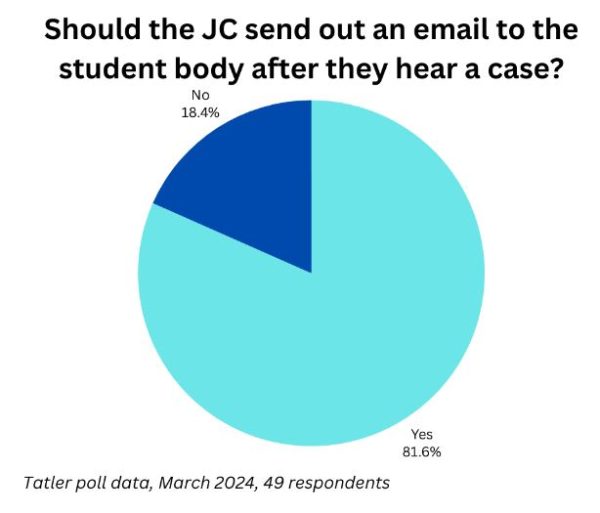Recently, the U.S. Supreme Court has been in the news more than ever, handing down critical decisions — on everything from abortion rights to Donald Trump — that will impact the 2024 election. In Bliss Hall, Lakeside’s own judicial body, the Judicial Committee has been active, too. I am currently a sophomore representative on JC. I am answering some questions about the committee submitted in the “Tatler” poll.
“Why haven’t we gotten a single JC email this year? Has no one gotten in trouble?”
There have actually been five cases this year. In the past, the Judicial Committee notified the community every time it heard a case. Dating back to the JC’s predecessor, the Lakeside Student Court, students could come and watch the disciplinary hearings of their peers, and “Tatler” even published reports on the court cases that named the “defendants.” The modern committee, until this year, sent an email to the student body after every hearing, describing the incident and the committee’s decision without naming the student. However, this year, the committee decided to stop sending out the emails. When asked about this decision, Ms. Suttell, Upper School Assistant Director, the nonvoting faculty member who oversees the committee, said that the primary reason for the change was to protect student privacy: “We want it to be a process that centers learning and growth, and it can be hard to do that if you’re worried about being embarrassed or other people knowing.” Ms. Suttell added, “As I’ve worked with students in the JC process this year, it has been a huge source of relief to them to know that there would not be an email about their specific incident and I think that has enabled those students to go through the process and have it feel less shameful and punitive and more focused on growth and learning.”
Now, rather than sending emails after each case, the JC will send a report at the end of each semester summarizing the cases the committee heard over the half-year period.
Ms. Suttell notes that there was not an email sent out at the end of the fall semester this year because the JC had only seen one case at that point and “that didn’t feel like enough to send a summary.” You can expect to receive an email in May or June summarizing the year’s JC cases.

“I’ve heard [the JC has] a history of race-based discrimination … I don’t know if that’s true and haven’t experienced it myself, but it’s a pretty persistent rumor, so who knows.”
I spoke to Ms. Suttell about this comment, and she shared that she has started working with a member of the tech office to analyze a database of JC cases going back 20 years. The goal of the analysis is to identify any trends in which groups of students come before the committee and what consequences those students receive. Factors that may be evaluated include students’ race, gender, whether or not a student attended Lakeside Middle School, and more.
Though the analysis is not complete yet, I can say that the biggest thing I have done and seen other JC members do during hearings to minimize the risk of bias and maintain consistency is basing our decisions off precedent. During the hearings, Ms. Suttell often tells us about any similar cases that have come before the JC in the past; the committee considers the outcomes of those previous cases as we deliberate.
“What misdemeanors get judged by our classmates? How much work do [JC reps] have to complete per week for this?”
Teachers are required to report possible violations of community expectations to Ms. Suttell. When Ms. Suttell finds out about a case, administrators decide whether or not it should come before the committee. Some minor issues, such as parking violations or non-seniors leaving campus, can be dealt with directly by a classroom teacher or another Lakeside employee like Mr. Kempf, while extremely serious cases like those involving accusations of sexual assault or anything else that might involve law enforcement are handled directly by administrators. Everything in the middle — such as most cases of academic dishonesty, like cheating on a test or using ChatGPT to write an essay — comes before the Judicial Committee. There is no set amount of work per week but, outside of hearing cases, JC members meet periodically during ACT to discuss the committee’s work and brainstorm about how to improve the committee.
“How does the JC process work?”
Once a case is referred to JC, Ms. Suttell works with the student who is coming before the committee to write a “Statement of Fact,” which is a paragraph that describes the basic details of the incident. Just prior to the hearing, which takes place after school in Bliss Hall, JC members gather in a room and read this “Statement of Fact.” Then, the student comes into the room with their advisor and reads a pre-prepared, reflective statement that provides their perspective on the incident. JC members are then allowed to ask the student questions. Sometimes, a classroom teacher or another Lakeside adult relevant to the case will also be present to answer questions. After the questioning, the student, their advisor, and any other people involved with the case leave the room while the committee deliberates about an appropriate “response” to the incident. Possible outcomes include grade penalties, meetings with teachers or counselors, suspension, expulsion, and more.
I hope that this helped bring more transparency to the Judicial Committee. If you have any more questions, feel free to reach out to me.



